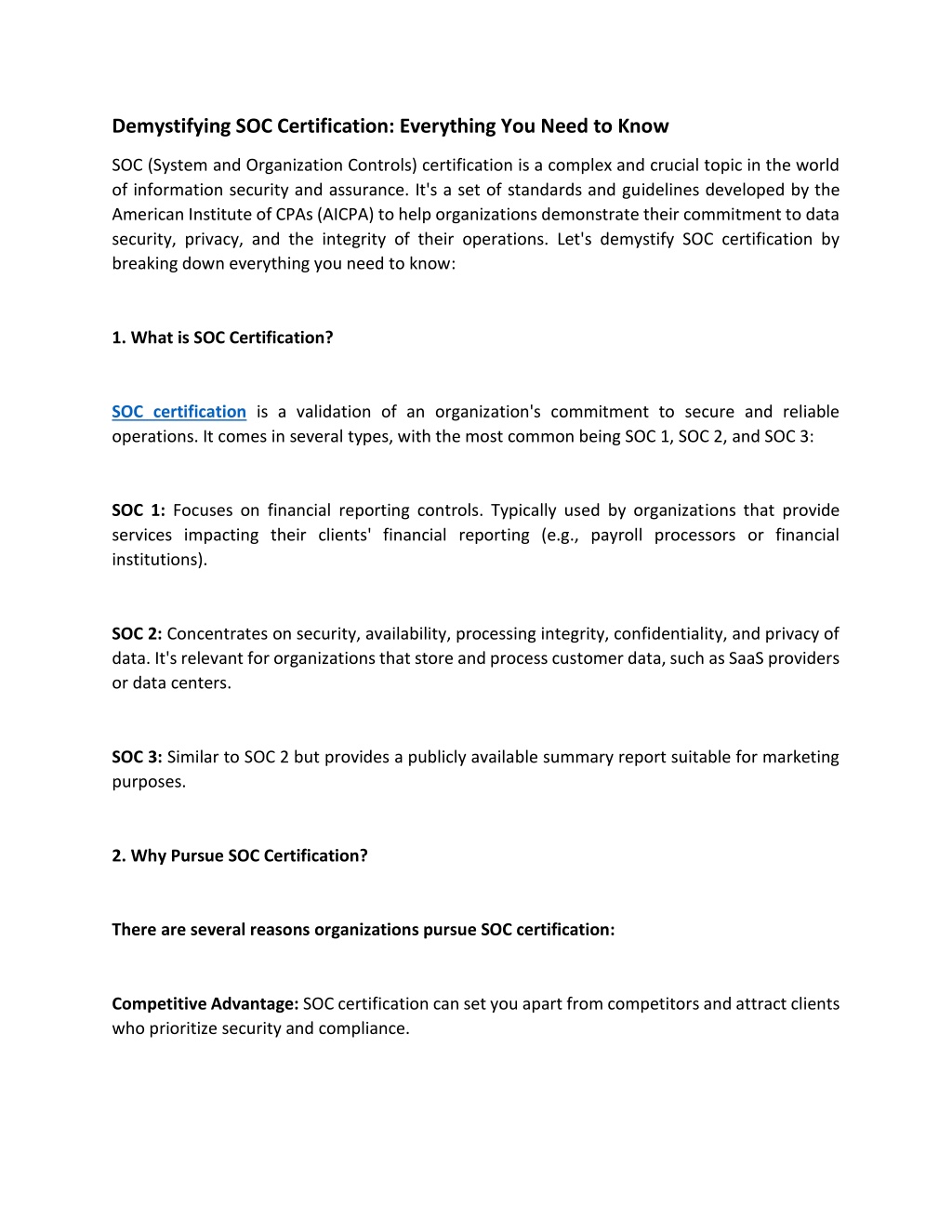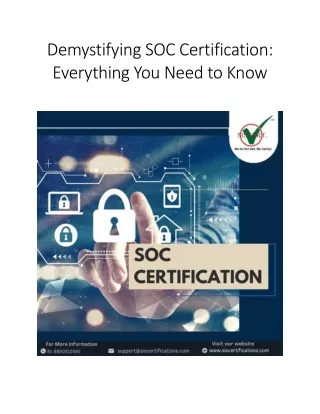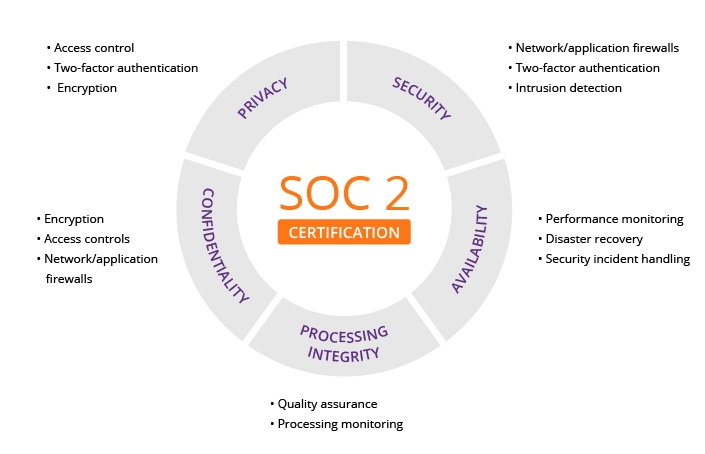The SOC Certification Wiki: Everything You Need to Know
In today’s increasingly complex digital landscape, organizations face relentless cyber threats. Protecting sensitive data and critical infrastructure requires a robust security posture, and at the heart of this defense lies the Security Operations Center (SOC). Professionals working within SOCs are the frontline warriors in this battle, and their expertise is highly sought after. This article serves as your comprehensive wiki, providing everything you need to know about SOC certifications – from their importance to the top certifications available. Whether you’re a seasoned cybersecurity professional or just beginning your journey, this guide will equip you with the knowledge to navigate the world of SOC certifications effectively.
Why SOC Certifications Matter
SOC certifications validate the skills and knowledge required to effectively operate and manage a Security Operations Center. They demonstrate a commitment to industry best practices and provide a benchmark for assessing competency. Here’s why pursuing a SOC certification is crucial:
- Enhanced Credibility: Certifications establish your expertise and credibility within the cybersecurity field, making you a more attractive candidate to employers.
- Improved Skills and Knowledge: Certification programs often cover a wide range of topics, including incident response, threat detection, vulnerability management, and security analytics, thereby enhancing your overall skill set.
- Career Advancement: Holding a relevant SOC certification can open doors to higher-level positions and increased earning potential.
- Industry Recognition: Certifications from reputable organizations are often recognized and valued by employers globally.
- Staying Current: Certification programs often require ongoing professional development, helping you stay abreast of the latest threats, technologies, and best practices.
Key Areas Covered in SOC Certification Programs
SOC certifications typically cover a broad range of topics essential for effective SOC operations. These often include:
- Security Fundamentals: Core security concepts, including confidentiality, integrity, and availability (CIA triad).
- Network Security: Understanding network protocols, security devices (firewalls, IDS/IPS), and network traffic analysis.
- Endpoint Security: Hardening and securing operating systems, endpoint detection and response (EDR) solutions, and malware analysis.
- Threat Intelligence: Collecting, analyzing, and utilizing threat intelligence feeds to proactively identify and mitigate risks.
- Security Monitoring and SIEM: Using Security Information and Event Management (SIEM) systems to collect, analyze, and correlate security events.
- Incident Response: Developing and executing incident response plans, including containment, eradication, and recovery.
- Vulnerability Management: Identifying, assessing, and mitigating vulnerabilities in systems and applications.
- Digital Forensics: Performing basic digital forensics investigations to analyze security incidents.
- Security Automation and Orchestration: Using automation tools to streamline security tasks and improve efficiency.
- Compliance and Regulations: Understanding relevant security standards and regulations (e.g., GDPR, HIPAA, PCI DSS).
Top SOC Certifications to Consider
The cybersecurity landscape offers a variety of certifications tailored to SOC professionals. Here are some of the most recognized and sought-after:
- Certified SOC Analyst (CSA) by EC-Council: This certification provides a foundational understanding of SOC operations, including incident response, threat hunting, and security monitoring. It is ideal for those starting their SOC career.
- GIAC Security Operations Certified (GSOC) by SANS Institute: The GSOC certification focuses on practical skills in security operations, incident handling, and threat analysis. It’s a popular choice for experienced SOC analysts.
- CompTIA Security+: While not exclusively a SOC certification, Security+ provides a broad understanding of security concepts and is often a prerequisite for more advanced SOC certifications. It serves as a great foundation.
- Certified Information Systems Security Professional (CISSP) by (ISC)²: The CISSP is a globally recognized certification that covers a wide range of security domains, including security and risk management, asset security, security architecture and engineering, communication and network security, identity and access management, security assessment and testing, security operations, and software development security. It is suitable for experienced security professionals.
- Cisco Certified CyberOps Associate: This certification validates the skills needed to work in a Security Operations Center, including security monitoring, incident response, and data analysis, and focuses on Cisco security technologies.
Choosing the Right SOC Certification
The best certification for you depends on your experience level, career goals, and the specific role you’re targeting within the SOC. Consider the following factors:
- Your Experience Level: Entry-level certifications like CSA are suitable for beginners, while advanced certifications like CISSP are better suited for experienced professionals.
- Your Career Goals: Research the certifications that are most valued by potential employers in the roles you’re interested in.
- The Certification’s Focus: Some certifications focus on specific areas like incident response or threat hunting, while others provide a broader overview of SOC operations.
- Training and Resources: Evaluate the quality of training materials, practice exams, and other resources offered by the certification provider.
- Cost and Time Commitment: Consider the cost of the certification exam, training courses, and the time required to prepare.
Preparing for Your SOC Certification Exam
Successful certification requires dedicated preparation. Here are some tips to help you:
- Identify Your Weaknesses: Assess your current knowledge and skills to identify areas where you need to improve.
- Choose a Training Method: Select a training method that suits your learning style, such as instructor-led courses, self-study materials, or online boot camps.
- Utilize Practice Exams: Practice exams are essential for getting familiar with the exam format and testing your knowledge.
- Hands-on Experience: Gain hands-on experience with relevant security tools and technologies through labs and real-world projects.
- Join Study Groups: Connect with other candidates to share knowledge, discuss concepts, and stay motivated.
- Stay Updated: Keep abreast of the latest security threats, technologies, and best practices by reading industry publications and attending webinars.
The Future of SOC Certifications
The cybersecurity landscape is constantly evolving, and SOC certifications will continue to adapt to meet the changing demands of the industry. We can expect to see:
- Increased Emphasis on Automation and AI: Certifications will likely incorporate more content on security automation, orchestration, and the use of artificial intelligence (AI) in SOC operations.
- Focus on Cloud Security: Certifications will need to reflect the growing importance of cloud security, with content on cloud-based security tools and best practices.
- Specialized Certifications: We may see more specialized certifications focusing on specific areas of SOC operations, such as threat hunting or malware analysis.
- Continuous Learning Requirements: Certification programs may place more emphasis on continuous learning and professional development to ensure that professionals stay current with the latest threats and technologies.
Conclusion
SOC certifications are a crucial investment for any cybersecurity professional looking to advance their career and contribute to a strong security posture. By understanding the importance of these certifications, exploring the available options, and preparing effectively, you can position yourself for success in the dynamic world of SOC operations. This guide has provided a comprehensive overview, and we encourage you to begin your journey today!
Frequently Asked Questions (FAQs)
1. How long does it take to get a SOC certification?
The time it takes to obtain a SOC certification varies depending on the certification, your prior experience, and your study habits. Some certifications can be obtained within a few weeks or months, while others may require more time.
2. Are SOC certifications worth the investment?
Yes, SOC certifications are generally worth the investment. They can lead to enhanced job prospects, increased earning potential, and a deeper understanding of cybersecurity concepts.
3. Do I need a degree to get a SOC certification?
No, a degree is not always a requirement for obtaining a SOC certification. However, some certifications may have experience or prerequisite requirements.
4. What are the typical job roles for someone with a SOC certification?
Common job roles for certified SOC professionals include SOC Analyst, Security Engineer, Incident Responder, Threat Hunter, and Security Operations Manager.
5. How do I maintain my SOC certification?
Most SOC certifications require you to earn Continuing Education Units (CEUs) or complete other professional development activities to maintain your certification. Requirements vary depending on the certification provider.



